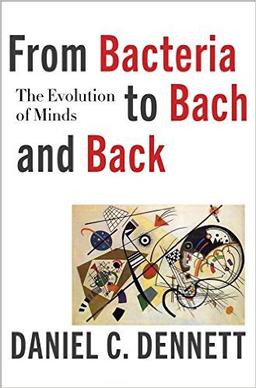 I have always been interested in the evolution of humanity, and especially that of language and reasoning. FBBB tackles this very problem. The book introduces (to me at least) the concept of "competence without comprehension". At its simplest, an elevator is competent at moving people up and down, but does not comprehend what it is doing. The same can be said for Watson answering questions on Jeopardy. One of the messages of Dennett is "don't worry about machines taking us over", which relies heavily on this concept. For me, as a software guy, I was struck by how many times Dennett relied on software and hardware analogies taken from my industry. I too have often pondered these obvious similarities. For example, in computing, routine chores (like printing an essay) are passed off to sub-processors (purpose built and programmed chips) so the main CPU (a remark from the Department of Redundancy Department?) can do other things. A good human example is catching a hit baseball. A good player can, within a fraction of a second, "calculate" where that ball is going and where she has to be to catch it. They can then run to that spot, perhaps with a single refining glance at the ball, turn and catch it. No logical thought goes into any of this. No formula is used to calculate when and where the parabolic arc of the ball will cause it to intersect with the ground. Those calculations are farmed out and unconscious. DNA itself is essentially a binary digital code... slightly less complex than Morse. Another thought, which I raise in my book, is the sub-processing associated with interpreting incoming data from the outside world… i.e.: incoming sensual info. We have dozens of senses, and they are all working at once. One of the tricks of the trade in brains and computers is to manage the avalanche of incoming data and separate the wheat from the chaff on the fly. If we could not do this, we would all go nuts (schizophrenia may be an example of this). Evolution is a master at getting the balances and trade-offs just right… a daunting task and a necessary one if you are going to be you (i.e.: your sense of self awareness). This sense is an illusion, but it is a tough one to kick. (Of course, evolution does no such thing, but it is hard to think about it without get all anthropomorphic.) Another key component to our minds is Bayesian mathematics. Once pooh-poohed by math purists, it is, nevertheless, in common use by computers today for many different purposes. We use it all the time in our heads, and smarter people are at least somewhat aware of this. Here is the idea: You get a new piece of information in the "game of life". It could be anything at all, like say, a stock price goes up. You note this information. It does not trigger any action per se, other than you mumbling to yourself "oh, gold went up". But in your head, many of your other beliefs may be slightly adjusted (e.g.: "perhaps I should invest more in commodities", or some such). This too will affect other ideas in your head and so on. We do it without thinking or rigor. Computers can do it better because it is an extremely computationally-intensive chore. Each adjustment of a "dial" in you head affects the dials near it, which means they must be adjusted… but this means the original dial is affected and it must be adjusted again… on and on until the adjustments are to small to measure (in computing, this is called "relaxing a network"). This book is not an easy read. It is very thought provoking. One of the central themes in my book The God Con is that con artists and lying have shaped out mental evolution. I am happy to report that Dennett says nothing to contradict my hypothesis, and he even supports it to a degree. The idea here is that we are unique in the animal world in that we have empathy. We can imagine ourselves as another, and ask "What would I do or feel in that circumstance, if I were him or her". This ability is crucial to establishing our self-identity. You cannot understand a con without this ability. The ideas are intertwined. Dennett even discusses the Nigerian Prince scam, for example, and why it is still alive today. Dennett goes on to discuss cultural evolution and memes in some detail. For you computer fans: memes are applets that can run on any virtual machine (aka: your brain). Our brains are an onion of virtual machines within virtual machines. P-code (Pascal's pseudo-code) died years ago, but the idea came back with a vengeance with scripted languages for the internet. This resurgence is driven by the fact that computers are blindingly fast compared to the 19080s. The evolution of language has been deemed "the hardest problem in science". Nobody knows how it happened, or when. As little as 50,000 years ago, language may have been rudimentary at best. But the point is, it did evolve, and Dennett offers a plausible explanation for how that happened. A line I liked: Consciousness may not be real, but it is remarkably efficient to act as if it did. George Carlin once said: "For years, I thought the most important organ in my body was my brain, until I realized one morning 'Look who is telling me that!'" One last point Dennett makes, and I agree, is that it should be illegal to pass off a computer as a human being. In a year or two, it will be possible to appear to make anyone say or do anything with a computer simulacrum. As I write, an unflattering doctored video of Nancy Pelosi is making its way around the internet, and the wanna-believers are lapping it up. Thanks Facebook! This is the just pointy tippy-top of the iceberg. As books go, this one is as deep as they get: Man trying to fathom his own mind.
0 Comments
|
AuthorLee Moller is a life-long skeptic and atheist and the author of The God Con. Archives
May 2024
Categories
All
|

 RSS Feed
RSS Feed